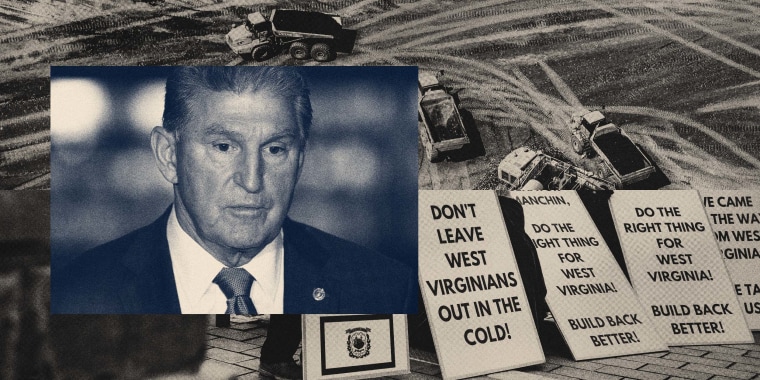Sen. Joe Manchin, D-W.Va., promotes himself as a man of the people. He’s described in media accounts as a “folksy” pol whose acumen is “a road map for appealing to less-educated and rural voters,” and he accuses members of his own party of falling out of touch with “how most people live their lives.” The fact that, in our polarized era, he’s managed to keeping winning elections as a Democrat in an impoverished red state has given him a special Rust Belt-whisperer status inside the Beltway, a reputation for organically understanding politics outside the world of elites.
But Manchin’s protracted resistance to President Joe Biden’s Build Back Better bill is a clear reminder that he is, in fact, hellbent on prioritizing elite interests over those of ordinary people. And the simplest illustration of that might be the intensifying divide between West Virginia’s miners and mine owners over the legislation.
Manchin, by opposing Build Back Better and panning its climate provisions, is siding with the capitalists over the workers.
A report Monday in The New York Times explains how the United Mine Workers, America’s largest coal miners union, has begged Manchin to support the Build Back Better bill on the grounds that it would provide its workers with the best possible economic future. The bill would, among other things, help finance a trust fund for miners suffering from black lung disease, provide protections for unions and, crucially, invest in plans to help the local economy make the transition from coal to renewable energy.
As The Times reports, the plans to aid displaced coal miners and help them find jobs in renewable energy have finally won the support of workers from a sector that never saw the fulfillment of former President Donald Trump’s promises of a coal revival. But mine owners are digging in their heels:
The miners appear to have embraced the reality that coal is dying and they must look beyond it to survive, but their bosses do not see the end as inevitable.
Chris Hamilton, the president of the West Virginia Coal Association, which represents the owners, said coal employment would remain viable for years to come, and he accused the unions of “waving a white flag.” …
“We would have thought they’d have gone down swinging,” he added.
Phil Smith, the United Mine Workers’ chief lobbyist, responded, “We’re still swinging, but we’re swinging in a smart way and in a way that will provide a real future for fossil energy workers in West Virginia and throughout the country.”
Manchin, by opposing Build Back Better and panning its climate provisions, is siding with the capitalists over the workers. And it shouldn’t go unnoticed.
Nor should it go unnoticed that Manchin, as the owner of a business that sells waste coal to a power plant in West Virginia, is a coal tycoon himself. He has a direct financial interest in protecting the coal industry, which has helped make him a Maserati-driving multimillionaire and continues to provide him with hundreds of thousands of dollars a year in revenue. And his business could take a hit under clean electricity provisions in Build Back Better. Due to egregious ethics norms, Congress permits lawmakers to make and block laws that could directly affect their sources of income outside their congressional salaries. In other words, it’s perfectly legal for lawmakers to use the law to protect or enhance their wealth.
Manchin has a charming West Virginia accent, and it’s true that some of his conservative views are faithful representations of those of the people of his state. But he is no everyman — and his views on the Build Back Better bill — a plan whose provisions are overwhelmingly popular in West Virginia, and which has the backing of miners who Manchin has long claimed are a priority for him — aligns him with an exploitative ownership class in his state, not the economically struggling people who’ve long suffered at its hands.

